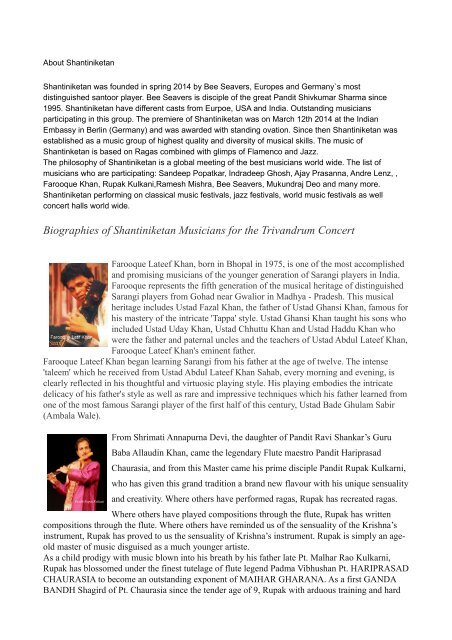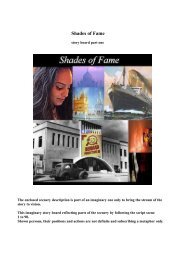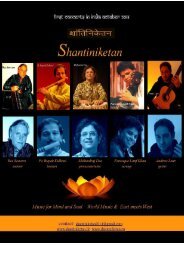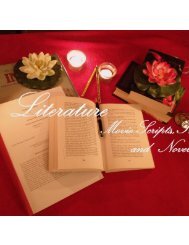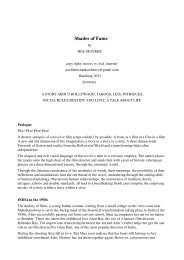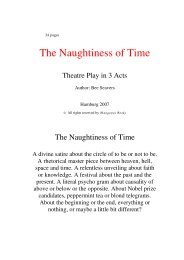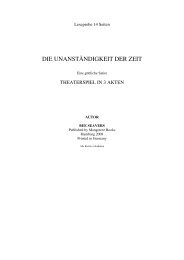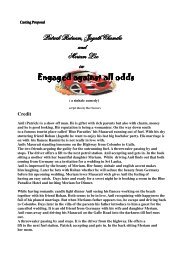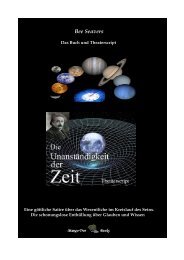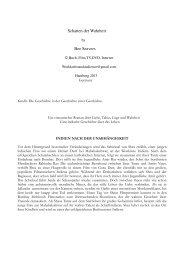o_18u5r6qdo87bpdg1mbva2padja.pdf
Create successful ePaper yourself
Turn your PDF publications into a flip-book with our unique Google optimized e-Paper software.
About Shantiniketan<br />
Shantiniketan was founded in spring 2014 by Bee Seavers, Europes and Germany`s most<br />
distinguished santoor player. Bee Seavers is disciple of the great Pandit Shivkumar Sharma since<br />
1995. Shantiniketan have different casts from Eurpoe, USA and India. Outstanding musicians<br />
participating in this group. The premiere of Shantiniketan was on March 12th 2014 at the Indian<br />
Embassy in Berlin (Germany) and was awarded with standing ovation. Since then Shantiniketan was<br />
established as a music group of highest quality and diversity of musical skills. The music of<br />
Shantinketan is based on Ragas combined with glimps of Flamenco and Jazz.<br />
The philosophy of Shantiniketan is a global meeting of the best musicians world wide. The list of<br />
musicians who are participating: Sandeep Popatkar, Indradeep Ghosh, Ajay Prasanna, Andre Lenz, ,<br />
Farooque Khan, Rupak Kulkani,Ramesh Mishra, Bee Seavers, Mukundraj Deo and many more.<br />
Shantiniketan performing on classical music festivals, jazz festivals, world music festivals as well<br />
concert halls world wide.<br />
Biographies of Shantiniketan Musicians for the Trivandrum Concert<br />
Farooque Lateef Khan, born in Bhopal in 1975, is one of the most accomplished<br />
and promising musicians of the younger generation of Sarangi players in India.<br />
Farooque represents the fifth generation of the musical heritage of distinguished<br />
Sarangi players from Gohad near Gwalior in Madhya - Pradesh. This musical<br />
heritage includes Ustad Fazal Khan, the father of Ustad Ghansi Khan, famous for<br />
his mastery of the intricate 'Tappa' style. Ustad Ghansi Khan taught his sons who<br />
included Ustad Uday Khan, Ustad Chhuttu Khan and Ustad Haddu Khan who<br />
were the father and paternal uncles and the teachers of Ustad Abdul Lateef Khan,<br />
Farooque Lateef Khan's eminent father.<br />
Farooque Lateef Khan began learning Sarangi from his father at the age of twelve. The intense<br />
'taleem' which he received from Ustad Abdul Lateef Khan Sahab, every morning and evening, is<br />
clearly reflected in his thoughtful and virtuosic playing style. His playing embodies the intricate<br />
delicacy of his father's style as well as rare and impressive techniques which his father learned from<br />
one of the most famous Sarangi player of the first half of this century, Ustad Bade Ghulam Sabir<br />
(Ambala Wale).<br />
From Shrimati Annapurna Devi, the daughter of Pandit Ravi Shankar’s Guru<br />
Baba Allaudin Khan, came the legendary Flute maestro Pandit Hariprasad<br />
Chaurasia, and from this Master came his prime disciple Pandit Rupak Kulkarni,<br />
who has given this grand tradition a brand new flavour with his unique sensuality<br />
and creativity. Where others have performed ragas, Rupak has recreated ragas.<br />
Where others have played compositions through the flute, Rupak has written<br />
compositions through the flute. Where others have reminded us of the sensuality of the Krishna’s<br />
instrument, Rupak has proved to us the sensuality of Krishna’s instrument. Rupak is simply an ageold<br />
master of music disguised as a much younger artiste.<br />
As a child prodigy with music blown into his breath by his father late Pt. Malhar Rao Kulkarni,<br />
Rupak has blossomed under the finest tutelage of flute legend Padma Vibhushan Pt. HARIPRASAD<br />
CHAURASIA to become an outstanding exponent of MAIHAR GHARANA. As a first GANDA<br />
BANDH Shagird of Pt. Chaurasia since the tender age of 9, Rupak with arduous training and hard


